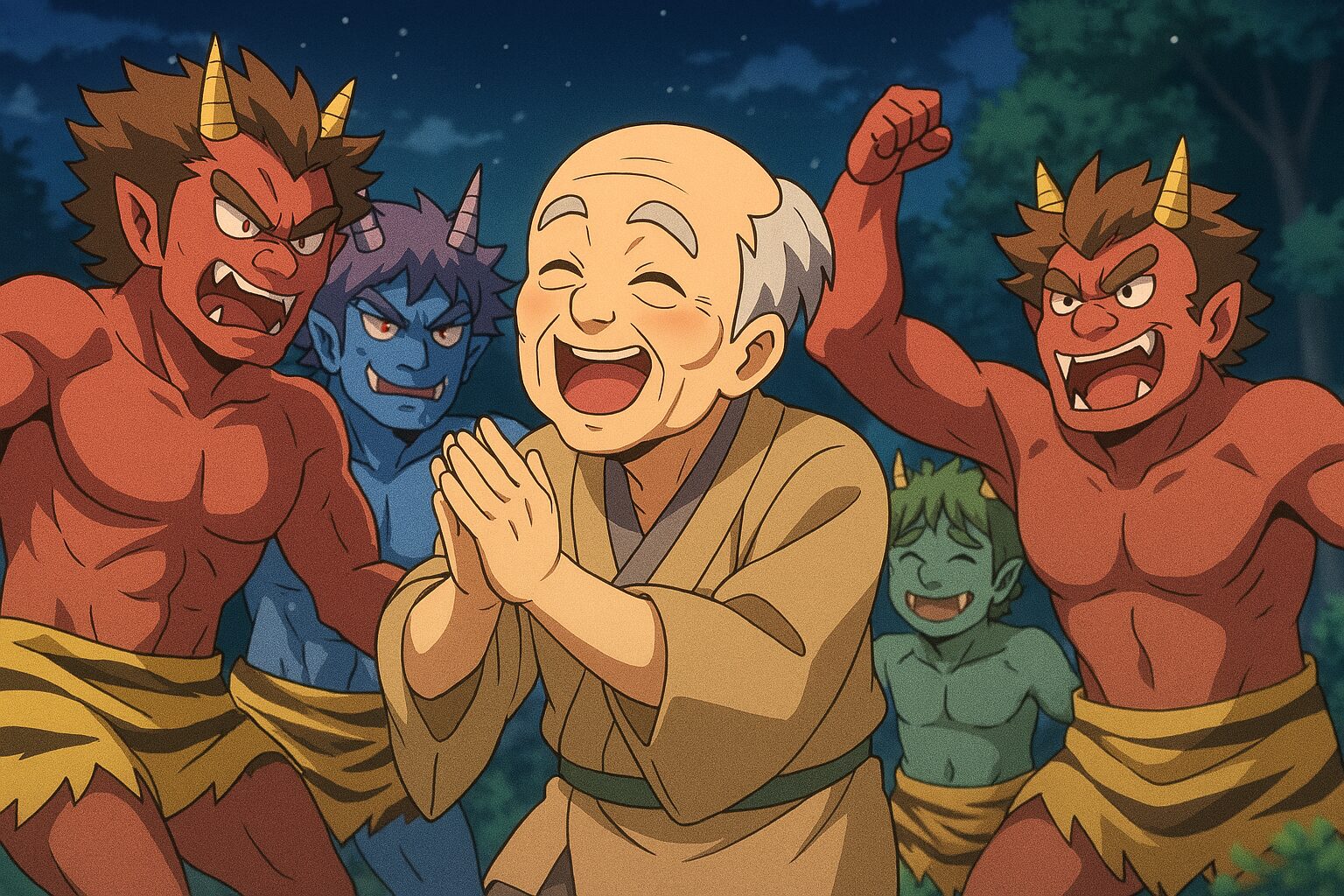This traditional Japanese story blends humor, cultural symbolism, and timeless wisdom. Discover how a humble old man wins the favor of demons through dance—and what it teaches us about character.
📚 Explore more Japanese folktales here
- Introduction: Folktales as Mirrors of Humanity
- The Story: A Demon’s Party and a Surprising Gift
- The Greedy Man’s Mistake
- Moral: True Beauty Comes from Within
- Understanding Oni: Demons in Japanese Culture
- Regional Roots: Folktales from Nara and Kyoto
- Message to Global Readers: Folktales as Cultural Translators
- Why This Story Endures: Humor, Irony, and Insight
- Further Reading & Resources
- はじめに:日本の昔話が語る“人間らしさ”
- 物語の概要:鬼の宴に招かれた老人
- 二人目の老人:欲が招いた悲劇
- 教訓:見た目よりも心の美しさ
- 鬼という存在:日本文化における“善悪の境界”
- 地域とのつながり:昔話が育まれた風土
- 海外読者へのメッセージ:昔話は“心の翻訳者”
- 読み物としての魅力:ユーモアと皮肉のバランス
- 関連リンク・参考資料まとめ
Introduction: Folktales as Mirrors of Humanity
Japanese folktales are more than bedtime stories—they’re cultural mirrors reflecting values, emotions, and moral lessons. “Kobutori Jiisan” is one such tale, offering a humorous yet profound look at kindness and greed.
The Story: A Demon’s Party and a Surprising Gift
Long ago, two elderly men lived in a village. Both had large lumps (kobu) on their faces, but their personalities were opposites. One was gentle and cheerful, the other greedy and mean-spirited.
One day, the kind old man went to the mountains to gather firewood. As night fell and rain poured, he took shelter under a tree. Suddenly, a group of demons (oni) appeared and began a lively feast. Instead of fleeing, the old man joined in—dancing joyfully. The demons were delighted and said, “Come dance again tomorrow!” As a reward, they removed the lump from his face and took it with them.
The Greedy Man’s Mistake
Hearing of this miracle, the greedy old man tried to imitate it. He went to the same spot and danced before the demons—but his dance was awkward, and his attitude arrogant. The demons were displeased and said, “We’ll return the other lump too!” They added the first man’s lump to his face, leaving him with two.
Moral: True Beauty Comes from Within
This tale teaches that kindness, humility, and joy are more valuable than appearance or greed. The kind man’s selfless spirit brought him unexpected blessings, while the greedy man’s selfishness led to misfortune.
Understanding Oni: Demons in Japanese Culture
Unlike Western demons, Japanese oni are complex figures. They can be terrifying, comical, or even benevolent. In “Kobutori Jiisan,” the oni are playful and responsive to human emotion—highlighting the blurred lines between good and evil in Japanese folklore.
👹 Learn more about Oni at the International Research Center for Japanese Studies
Regional Roots: Folktales from Nara and Kyoto
Stories like “Kobutori Jiisan” were passed down through generations in regions like Nara and Kyoto—areas rich in temples, oral traditions, and seasonal festivals. These tales often served as moral education and cultural bonding tools.
🏯 Explore regional folktale archives at Nara Prefectural Library
Message to Global Readers: Folktales as Cultural Translators
“Kobutori Jiisan” resonates across cultures. It invites readers to reflect on what truly defines a person—not wealth or looks, but the heart. Folktales like this are timeless bridges between worlds.
🌐 Read more Japanese folktales in English at World of Tales
Why This Story Endures: Humor, Irony, and Insight
The tale’s charm lies in its balance of comedy and wisdom. A dancing old man, a feast of demons, and a twist of fate—these elements make “Kobutori Jiisan” both entertaining and thought-provoking.
Further Reading & Resources
| Topic | Link |
|---|---|
| Japanese Folktale Series | kiri53.com |
| Oni Cultural Background | Nichibun Research Center |
| Regional Folktale Archives | Nara Prefectural Library |
| English Translations of Folktales | World of Tales |
© Japanese Folktale Series. All rights reserved.
こぶとり爺さん|鬼と踊った老人が教えてくれる心の美しさ
日本の昔話『こぶとり爺さん』を、文化的背景や教訓とともに海外読者向けに紹介します。
はじめに:日本の昔話が語る“人間らしさ”
昔話は、単なる子ども向けの物語ではなく、人生の教訓や文化的価値観を含んだ“心の鏡”です。『こぶとり爺さん』は、ユーモアと皮肉、そして深い人間理解が詰まった物語です。
物語の概要:鬼の宴に招かれた老人
ある村に二人の老人が住んでいました。一人は心優しく、もう一人は欲深くて意地悪。優しい老人は、山で薪を集めている最中、鬼の宴に遭遇し、踊りを披露。鬼たちは喜び、彼の顔のこぶを「預かる」と言って持ち去ります。
二人目の老人:欲が招いた悲劇
意地悪な老人も鬼の宴に参加しますが、踊りは下手で態度も悪く、鬼たちは怒って「昨日のこぶも返す」と言い、彼の顔にもう一つこぶをつけてしまいます。
教訓:見た目よりも心の美しさ
この物語は「人の価値は外見ではなく、内面にある」という教訓を伝えます。優しさや謙虚さが幸運を呼び、欲や傲慢さは災いを招くことを示しています。
鬼という存在:日本文化における“善悪の境界”
日本の「鬼」は、単なる悪の象徴ではなく、時に人間的な感情を持つ存在です。『こぶとり爺さん』の鬼たちも、踊りを楽しむユーモラスなキャラクターとして描かれています。
地域とのつながり:昔話が育まれた風土
奈良や京都などの地域では、昔話が道徳教育や地域のアイデンティティ形成に活用されてきました。
海外読者へのメッセージ:昔話は“心の翻訳者”
『こぶとり爺さん』は、見た目や年齢を超えて共感できる物語です。海外の読者にとっても、「人の価値はどこにあるのか?」という問いを投げかける鏡のような存在です。
読み物としての魅力:ユーモアと皮肉のバランス
鬼の宴という非現実的な場面に、老人の踊りという滑稽な要素が加わり、読者は自然と物語に引き込まれます。そして最後には、深い気づきが残る構成です。
関連リンク・参考資料まとめ
| 内容 | リンク |
|---|---|
| 日本昔話シリーズ一覧 | kiri53.com |
| 鬼の文化的背景 | 国際日本文化研究センター |
| 地域文化と昔話 | 奈良県立図書情報館 |
| 英語で読める昔話 | World of Tales |
© Japanese Folktale Series. All rights reserved.



コメント